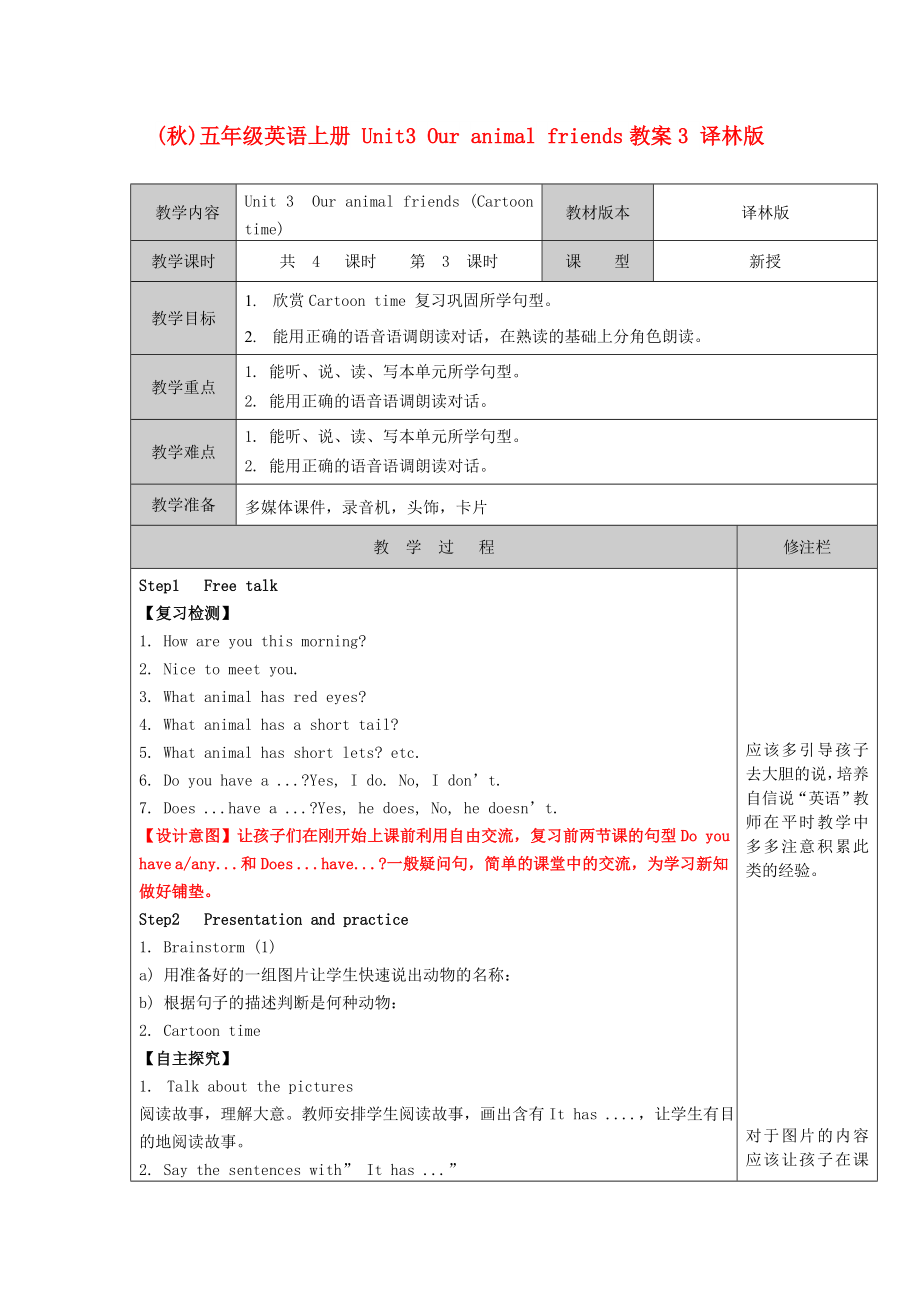《(秋)五年級(jí)英語(yǔ)上冊(cè) Unit3 Our animal friends教案3 譯林版》由會(huì)員分享����,可在線閱讀,更多相關(guān)《(秋)五年級(jí)英語(yǔ)上冊(cè) Unit3 Our animal friends教案3 譯林版(3頁(yè)珍藏版)》請(qǐng)?jiān)谘b配圖網(wǎng)上搜索����。
1、(秋)五年級(jí)英語(yǔ)上冊(cè) Unit3 Our animal friends教案3 譯林版
教學(xué)內(nèi)容
Unit 3 Our animal friends (Cartoon time)
教材版本
譯林版
教學(xué)課時(shí)
共 4 課時(shí) 第 3 課時(shí)
課 型
新授
教學(xué)目標(biāo)
1. 欣賞Cartoon time 復(fù)習(xí)鞏固所學(xué)句型。
2. 能用正確的語(yǔ)音語(yǔ)調(diào)朗讀對(duì)話����,在熟讀的基礎(chǔ)上分角色朗讀。
教學(xué)重點(diǎn)
1. 能聽(tīng)���、說(shuō)�����、讀、寫本單元所學(xué)句型�����。
2. 能用正確的語(yǔ)音語(yǔ)調(diào)朗讀對(duì)話���。
教學(xué)難點(diǎn)
1. 能聽(tīng)�、說(shuō)�����、讀���、寫本單元所學(xué)句型���。
2. 能用正確的語(yǔ)音語(yǔ)調(diào)
2����、朗讀對(duì)話���。
教學(xué)準(zhǔn)備
多媒體課件��,錄音機(jī)����,頭飾���,卡片
教 學(xué) 過(guò) 程
修注欄
Step1 Free talk
【復(fù)習(xí)檢測(cè)】
1. How are you this morning?
2. Nice to meet you.
3. What animal has red eyes?
4. What animal has a short tail?
5. What animal has short lets? etc.
6. Do you have a ...?Yes, I do. No, I don’t.
7. Does ...have a ...?Yes,
3��、 he does, No, he doesn’t.
【設(shè)計(jì)意圖】讓孩子們?cè)趧傞_(kāi)始上課前利用自由交流���,復(fù)習(xí)前兩節(jié)課的句型Do you have a/any...和Does ...have...?一般疑問(wèn)句,簡(jiǎn)單的課堂中的交流�����,為學(xué)習(xí)新知做好鋪墊。
Step2 Presentation and practice
1. Brainstorm (1)
a) 用準(zhǔn)備好的一組圖片讓學(xué)生快速說(shuō)出動(dòng)物的名稱:
b) 根據(jù)句子的描述判斷是何種動(dòng)物:
2. Cartoon time
【自主探究】
1. Talk about the pictures
閱讀故事�,理解大意。教師安排學(xué)生閱讀故事���,
4�、畫出含有It has ....�,讓學(xué)生有目的地閱讀故事。
2. Say the sentences with” It has ...”
1) It has ten legs.
2) It has eight legs.
3) It has big arms.
4) It has a big body too.
3. Read and answer:
教師設(shè)計(jì)問(wèn)題�����,進(jìn)一步來(lái)檢測(cè)學(xué)生的理解情況
1) Who is their new friend? (The crab is their new friend.)
2) What can the crab do? (It c
5����、an run.)
3) How many legs and arms does it have? (It has two arms and eight legs.)
4) How is its body?(It’s body is big and hard.)
5) Does the crab like cakes?
4. Imitate and remember
1) T: This time, let’s read the story after the tape.
2) T: Please read loudly by yourselves.
3) Read in ro
6���、les.
【設(shè)計(jì)意圖】讓孩子們仔細(xì)觀察圖片�,對(duì)圖片有整個(gè)感知�,互相討論,培養(yǎng)合作精神����。
a) 教師領(lǐng)讀詞組和句型;
b) 聽(tīng)錄音,跟讀對(duì)話����。
【小組合作】
分角色讀課文、自讀對(duì)話�、分角色表演。
Step3 Consolidation
【當(dāng)堂檢測(cè)】
1. 聽(tīng)寫單詞:art room, classroom, puter room, library, music room, playground
2. 聽(tīng)寫句型:Can you show her around? How many…? Is there a …? Yes, there is. No, there isn’t. A
7��、re there any…? Yes, there are. No, there aren’t. Let’s go and…
【設(shè)計(jì)意圖】學(xué)生在讀句子時(shí)����,能夠自己總結(jié)每個(gè)句子的語(yǔ)音語(yǔ)調(diào),讓孩子們多讀���,多想����,并能自己多造出多的句子���,培養(yǎng)孩子們語(yǔ)感的能力�����。
Step4 Homework
1. 預(yù)習(xí)Checkout time�。
2. 抄寫P92藍(lán)詞2+1。
應(yīng)該多引導(dǎo)孩子去大膽的說(shuō)����,培養(yǎng)自信說(shuō)“英語(yǔ)”教師在平時(shí)教學(xué)中多多注意積累此類的經(jīng)驗(yàn)。
對(duì)于圖片的內(nèi)容應(yīng)該讓孩子在課前進(jìn)行收集材料����,更能提高孩子們熱愛(ài)學(xué)習(xí)英語(yǔ)的興趣。
小故事讓孩子們自己閱讀�����,自己享受英語(yǔ)閱讀的氛圍����,應(yīng)該給孩子提供一些問(wèn)題,提高閱讀的興趣����。
板書設(shè)計(jì)
Unit 3 Our animal friends
It has…
Its… is/are…
教學(xué)反思
 (秋)五年級(jí)英語(yǔ)上冊(cè) Unit3 Our animal friends教案3 譯林版
(秋)五年級(jí)英語(yǔ)上冊(cè) Unit3 Our animal friends教案3 譯林版

